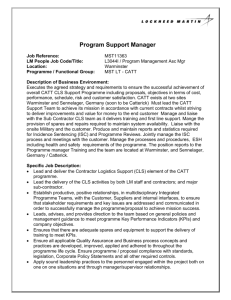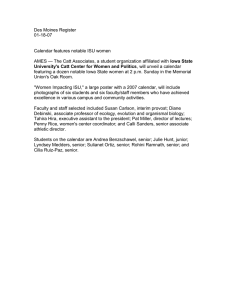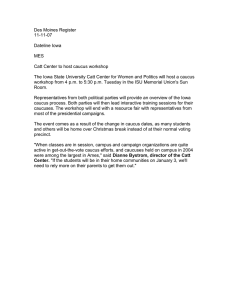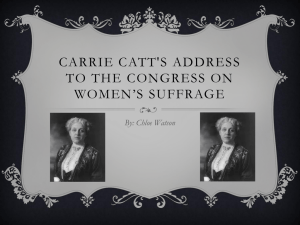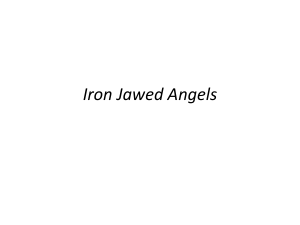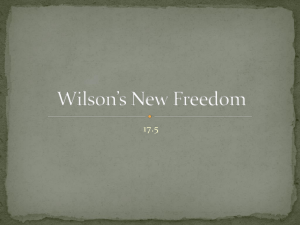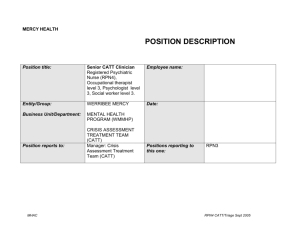Prison America
advertisement
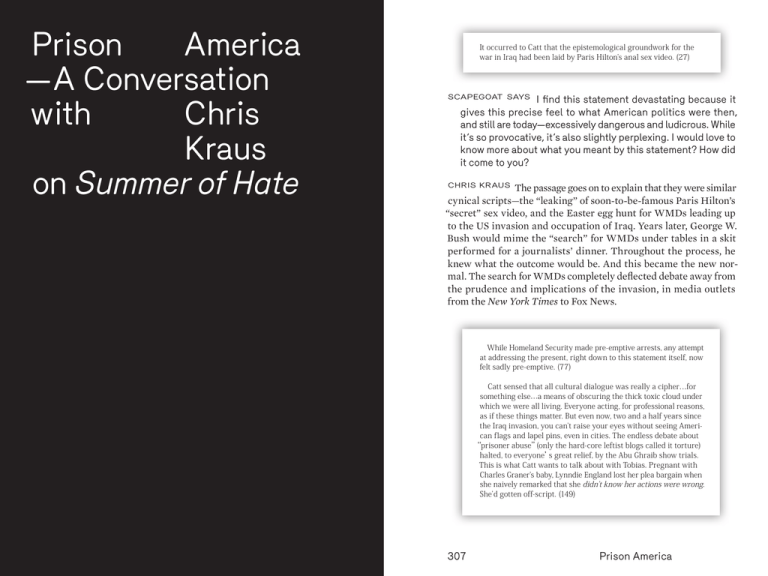
PrisonAmerica —A Conversation withChris Kraus on Summer of Hate It occurred to Catt that the epistemological groundwork for the war in Iraq had been laid by Paris Hilton's anal sex video. (27) scapegoat says I find this statement devastating because it gives this precise feel to what American politics were then, and still are today—excessively dangerous and ludicrous. While it’s so provocative, it’s also slightly perplexing. I would love to know more about what you meant by this statement? How did it come to you? chris kraus The passage goes on to explain that they were similar cynical scripts—the “leaking” of soon-to-be-famous Paris Hilton’s “secret” sex video, and the Easter egg hunt for WMDs leading up to the US invasion and occupation of Iraq. Years later, George W. Bush would mime the “search” for WMDs under tables in a skit performed for a journalists’ dinner. Throughout the process, he knew what the outcome would be. And this became the new normal. The search for WMDs completely deflected debate away from the prudence and implications of the invasion, in media outlets from the New York Times to Fox News. While Homeland Security made pre-emptive arrests, any attempt at addressing the present, right down to this statement itself, now felt sadly pre-emptive. (77) Catt sensed that all cultural dialogue was really a cipher…for something else…a means of obscuring the thick toxic cloud under which we were all living. Everyone acting, for professional reasons, as if these things matter. But even now, two and a half years since the Iraq invasion, you can't raise your eyes without seeing Ameri­can flags and lapel pins, even in cities. The endless debate about “prisoner abuse”(only the hard-core leftist blogs called it torture) halted, to everyone’s great relief, by the Abu Ghraib show trials. This is what Catt wants to talk about with Tobias. Pregnant with Charles Graner's baby, Lynndie England lost her plea bargain when she naively remarked that she didn't know her actions were wrong. She'd gotten off-script. (149) 306 Section Slug 307 Prison America Yesterday while they were juicing carrots and complaining about their respective careers, Terry had stopped and looked at her ob­ liquely. Isn't it weird, how nothing coming out now even mentions what's going on? And Catt knew. It was like they'd had to leave the country in order to say it. At least ten times a day for the past two or three years, Catt's thoughts hit the same wall as Terry's. To speak them out loud was completely uncool, because where would you start? God Bless Our Troops, hanging chads, Saw 2, Janet Jackson’s wardrobe malfunction? Do not expect truth. Nazism permeated the flesh and blood of the people through single words, idioms, and sentence structures which were imposed on them in a million repetitions and taken on board mechanically and unconsciously, wrote Victor Klemperer, the Jew who'd remained in hiding in Berlin throughout the Holocaust. In the summer of 2006, six thousand National Guardsmen were presidentially dispatched to patrol the Arizona/ Sonora border. Guantanamo Bay had been closed to journalists, human rights monitors, and the Red Cross after two prisoner sui­cides that vice President Cheney described as“acts of asymmetrical warfare.”Deprived of even the right to define their own deaths, hundreds of prisoners languished there, chargeless. (194–195) ssHow does the book construct an image of the political economy of war, which is the landscape of America in Summer of Hate? Can you speak more directly to how that conditioned a certain type of censorship for cultural workers and artists? the severe crackdown, initiated by the Bush administration, on “illegal” immigrants, intensified by police procedures that criminalize people of colour and the poor. What you directly deal with in the book, as Catt travels from LA to New Mexico, from Baja, Mexico to Arizona—a state under the reign of Joe Arpaio, the Arizona chief of police infamous for the “tent city” outdoor prison extension where he forced inmates to live in 140-degree weather—is how the excesses of American overzealousness are conjured through the contradictions present in the ecology of the American penal system. The effects of systemic punishment leave their mark on Paul, the former prisoner that Catt meets and hires to look after her buildings in Albuquerque. The contradictions inherent in the US prison culture that Paul faces as an ex-prisoner create a situation where life chances are impossible to resurrect. At the beginning of Summer of Hate, we get a glimpse of Paul’s situation while he and Catt are shopping for “fiestaware.” Catt asks if they should get turquoise or orange-coloured dishes. “Not orange,” Paul says. “I've got some pretty bad memories of that particular color.” And then he tells her everything—the drunken binge, the fuel credit card, the public defender, prison—or almost. He can't tell her everything. Bad enough he's a convicted felon. Catt steps into a cloud of compassion. So this is what she heard in his voice, that first time they talked on the phone when she was in Flagstaff. She cannot imagine spending even one day in prison. She's never done anything she couldn't talk her way out of. Paul spent sixteen months in state prison for defrauding Halliburton? Of less than one thousand dollars? Meanwhile, she's amassed tens of thousands by working within the tax code's gray zones. Unaware of his former employer's massive war crimes, Paul seems ashamed of stealing less than an art gallery spends on an after-party. (133) ck My memory of that period is the utter hopelessness of any resistance, not that “resistance” as exercised by a Los Angeles writer would be particularly meaningful. The polarization in the US at that moment was complete, between the “losers”—vegans with cars covered in bumper-stickers—opposing the war, and everyone else. The “everyone else” included not just the activist right, but the “creatives,” the art world, people who just wanted to live their own lives in the spaces outside the corporate mainstream and be left in peace. The Occupy movement, if nothing else, changed this culture of silence. ssIn the novel, you make critical associations between events that contextualize the politics of 9/11 during the Bush era. Moving beyond the mania of the “war on terror,” the narrative of war-making accentuates the growth of the prison-industrial complex, and the sentiment of a newfound nationalist fervour increasingly colouring the landscape. Summer of Hate reveals 308 Scapegoat ss Paul is doomed, trapped in a cycle of poverty. As you write, “If you punish the poor by making them poorer the cycle is endless” (160). Paul is trying to pay off his debts, his prison and parole fees; and at the same time he’s trying to find housing and a job, which are hard to come by because he’s forever labeled a felon. The book suggests there’s no real way out for Paul; if he wants to make a better life for himself, someone 309 Prison America like Catt is necessary. Catt has money. She helps him pay off what he owes that keeps him from getting a loan to start school; she offers him a job and housing. The absurdity and extremity of American penal culture is visualized so precisely in the book, not letting us forget, for instance, Arapaio’s chosen penal aesthetics: pink handcuffs and pink underwear that inmates are made to wear. Inmates and ex-prisoners are bound up in a cycle of humiliation, degradation, and endless forms of punishment, however literal or symbolic. ck Yes, that’s true. And sadly, not much has changed even now in 2013: Arpaio won re-election last November, and there isn’t an activist group whose members dare put their names on the group’s Facebook page. Arapaio’s impunity from retaliation against his opponents is legendary. Mary Rose Wilcox, a Democratic County Supervisor who dared to oppose him, was indicted by a grand jury on dozens of charges. Eventually she prevailed, but at what cost? What you say about Paul’s situation is crucial. One of the things I was trying to do with the novel was to show in this case study, with some specificity, exactly what a person who’s been through the system is facing when he or she is released. People have remarked that Summer of Hate is clumsily focused on numbers: how much did the lawyers cost, how much interest on the restitution, how much for the urinalysis, etc.? But that is the point! Adding it up, in Paul’s case, it took about $85,000 for him to erase the disadvantages of two decades of poverty and begin a new life. And clearly, that’s not going to happen most of the time. Similarly, the social service agencies serving the homeless in various programs in downtown LA spend tens of thousands of dollars to stabilize a handful of clients. The neglect and punitive treatment of these people is so severe, remediation is almost impossible. resounds so well in ours, even though you’re referring to past events—2005–2006—and because of this affinity, between the past and the present, Summer of Hate feels devastating in the sense that we are still living in the residue of it all. We’re living in Catt and Paul’s future political climate. How do you think things have changed? ck I didn’t exactly set out to publish a book about events in 2006 in 2012. I would have liked for the process to be faster. But it takes me a long time to write a book, and then there is the lead-time involved in publication. So it is a weird gap, a half-decade or so. Kathryn Bigelow’s film Zero Dark Thirty deals with events at a similar proximity and people seem to find this very disturbing. But I think it is way more interesting to deal with the present and recent past than fetishize revolutionary moments of the past. Many of the draconian measures taken during the Bush era have become the new normal, despite a less toxic rhetoric. The Patriot Act is still law, one in a hundred Americans are incarcerated, and we have accepted surveillance in all areas of our lives. At the end of Joe's first week on the job, thinking he'd keep him on the crew, Paul asked Joe if he had any references. And Joe said no. Then he confessed that he'd just gotten out of prison. Unfazed, Paul replied,“Oh. Which one?”and Joe said,“Las Cruces.”Paul didn't ask what the charge was. Instead, he told Joe that he'd spent time himself in Las Lunas. Joe knew right away that Las Lunas was Level III, and he knew then that Paul knew Las Cruces was Level V, maximum security. So he told Paul: “After getting divorced, I was sharing a place here in town with my mom and my sister. One night, my sister's ex-boyfriend showed up there drunk, wanting to talk to her. He had a gun he was waving around. My sister and mom were both there in the room, and I didn’ t think twice. I had a knife and I went for it. I did fourteen years. The public defender pled it to manslaughter.” Looking over the table, Catt realizes that everyone here except for herself and Tommy has been incarcerated, homeless, or both. When Titus and Sharon moved down from Sonoma, they lived in their van for two months, both working full-time until they could save up enough for an apartment. Cops in his small Texas town showed up at Evan's mom's house on his eighteenth birthday to arrest him for assault. At 16, he'd gotten into a fight with a classmate, but they'd deferred the charges two years so he'd go to jail, instead of receiving probation as a juvenile. “Yeah man…happy birthday! I'd just finished high school, and the guys they locked me up with were really scary.”Evan, his ssThese issues—related to poverty, mass incarceration, deportations, and perpetual war—are still with us today and are getting worse under the Obama administration. In an interview I read, you said, “I think that if we don’t try and process, both for ourselves and publically, what’s happening in the present, it’s a very great loss.” How does Summer of Hate try to process the present? Perhaps the context of Paul and Catt, their present, 310 Excess 311 Article Prison America Slug nal mischief, dishonored checks—each prisoner stands in front of the judge, eyes looking down toward cuffed hands. Why are the prisoners cuffed? Catt remembers a TV Guide cover she’ d seen as a child, a court drawing of Black Panther Bobby Seale shackled and chained to a chair in front of Judge Julius Hoffman. At the time, this was widely deemed shocking. Of course Seale was on trial in front of a jury, and these are just hearings. None of the inmates in Judge Sherry's court will ever be going to trial…Instead, imprisoned but not yet convicted, they'll receive continuance after continuance until the DA finally arrives at a plea. Paul doesn't look at the guys in the dock. He has to stay positive. Their sorry-ass plight reminds him how much he owes Catt. Blinking back tears she wonders, can anyone locate the point where this present begins? Before Abu Ghraib, before Guantanamo Bay… Was it the soft bans on public assembly? The laws against secondhand smoke, the DUI limit lowered to one glass of wine? Parks allowed to degrade until everyone wanted them closed, the defunding of public transportation, bottles of water that cost more than half the hourly minimum wage? For quality and training purposes, this call is being recorded and monitored…the first clause now mostly eliminated because it is no longer necessary. (239–240) mom, and his three-year old son moved to Albuquerque just to get out of Texas. His son's mom stayed behind. She was, like Brett's ex, a meth addict. Brett—who still hasn't decided whether to turn himself in on the warrant—lived alone on the beach in his van when he was 16, with an eight-month old infant. The Victorville painter, Jason's son Matt, spent part of his teens in San Bernadino County Juvenile Hall for spray-painting graffiti. Even the vendors she's hired have records! Zack, the artisan hippie who built a straw bale wall for them at Tulane, remembered Paul from the Farm. Zack had served 18 months for Possession With Intent To Sell—a few marijuana plants in his back yard. Was this Prison America? Catt never set out to do social work, but apparently everyone outside the art world has either lived in a van or been incarcerated. None of these people see any connection between their sad, shitty stories. Instead, they're ashamed. Except for Paul, who blames The Disease Known as Alcoholism, they put it down to bad luck and misfortune.”(143–144) ss What is Prison America? c k Prison America is where we are living now, where relatively few people know what goes on, on the other side of the mirror. ss Did you do research in order to write the characters introduced in your book, like the ones mentioned above? How did you initially come up with the idea for the book? What drove you to write it? ck You know, like Catt in the book, I’m not very good at making shit up. All of the people named in that passage and their stories are real, with the names changed around. Like Catt, I lived through this experience. Unlike Catt, I decided to turn it into a book. As these things were happening, many of them painful, I was aware that through this important knowledge, that through these events, I was being offered a glimpse of the web that enmeshes us, outside of the bubble. And it seemed very important to be able to write about this, that I would be able to do this as a novel and convey the interior lives of the characters. As each new case is called, Catt observes that the leg unshackling-and-reshackling procedure takes only slightly less time than the hearings. While a bailiff reads out the charges—possession of crack cocaine, grand theft auto, receipt of stolen property, crimi­- 312 Section Slug Scapegoat ss Do you think the American class structure is changing drastic- ally? Is Prison America creating an underclass? Are the differences becoming extreme because of the prison-industrial complex? If America is Prison America, then I feel the landscape you point to in Summer of Hate is conditioned by prison culture as it conditions poverty. Paul suffers from this. The fear and anxiety he feels is made very real in the novel; it drives the noir element of the narrative. The anxiety that haunts Catt is associated with being a famous writer, managing her finances and investing in property, and running away from her killer whom she met through an online S/M site. Later she leaps into this world of mayhem associated with fear and violence on this other, real level. She becomes this character that really steps up, offering support in a direct and personal way. Would Catt have done this if Paul wasn’t her lover? How would you describe what the ethical concerns are for Catt? Was Paul simply lucky to have met someone like her? Is survival reduced to luck in the novel? If Catt didn’t exist how would have Paul survived? ckGreat questions. I’m a great believer in luck, charmed coincidence, which is probably why I’m a writer, not a public policy 313 Prison America person. It’s very unlikely Catt would have done this for Paul if they weren’t connected on this intimate level as lovers. Really, there is no altruism; it just isn’t very realistic. There is definitely an underclass in the US that has replaced working-class culture. And that’s a consequence not just of the prison-industrial complex, but so many things: the impossibility of single-wage households for all but the rich; the fact that businesses cannot pay living wages and benefits and still be competitive; the replacement of most regional culture by corporate media. ssWhy the title Summer of Hate? ck The story takes place in that freakishly hot summer of 2006… and it’s the opposite of the 1960s, the “Summer of Love.” I couldn’t believe no one had used that title! But actually, there is a metal band of that name. ss In an interview you mention that fiction carries with it this real possibility of being able to “describe the world.” Is this related to what poet Eileen Myles has called a “cunt exegesis?” Myles was referring to your work in I Love Dick. What is a cunt exegesis, and does it apply to Summer of Hate? ckWell, actually, I think that was “dumb cunt exegesis.” It is a phrase I used in I Love Dick…the idea was that the “dumb cunt” might actually narrate her own story, on her own terms. The phrase was hyperbolic, of course, but—apparently even now—not inaccurate. It’s the idea that women and girls might have a less institutional form of “discourse,” of emotional thought, that is rarely respected within our culture. Bio Chris Kraus is a Los Angeles-based writer, art critic, curator, and filmmaker who teaches writing at the European Graduate School. Her critically acclaimed first novel, I Love Dick, came out in 1997, followed by Aliens and Anorexia in 2000, and Torpor in 2006. Kraus has published two prominent collections on art criticism, Video Green: Los Angeles Art and the Triumph of Nothingness (2004), and Where Art Belongs (2011), and is the co-editor of the powerful anthology, Hatred of Capitalism (2001). Kraus is also the co-director of the press Semiotext(e), where in 1990 she launched the imprint Native Agents, which introduced radical forms of writing that combine elements of theory, fiction, and autobiography. The imprint has published the work of such influential writers as Kathy Acker, Fanny Howe, Ann Rower and Eileen Myles. 314 Excess 315 Prison America
